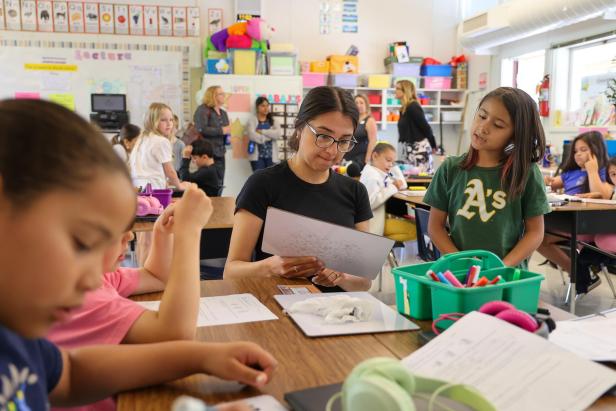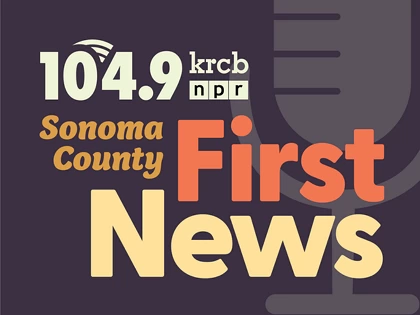 photo credit: Chris Ready for Napa Valley Unified School District via Bay City News
photo credit: Chris Ready for Napa Valley Unified School District via Bay City News
Teacher resident Araceli Avila Ramos, center, works with students
in a small group at Napa Valley's Pueblo Vista Elementary School
on May 19, 2025. Avila Ramos is a participant in a teacher residency
training program administered by Sonoma State University.
The university's five-year $3.2 million grant, approved under the Biden administration, was terminated after its first year on Sept. 16, leaving dozens of students at risk of dropping out mid-program.
The Sonoma State program combines coursework with a year-long, 900-hour classroom residency, which more than satisfies the state's 600-hour requirement for clinical practice. It prepares teachers to serve in high-need public schools across Sonoma, Napa, Mendocino and Solano Counties. Many of these schools are majority Hispanic, with large numbers of English learners.
"There's research that says that's what kids need," said Rhianna Henry Casesa, professor in the department of literacy studies and elementary education at Sonoma State University. "Kids do better when they have teachers that look like them. That is undeniable."
Casesa said that the residency year of unpaid clinical practice is what makes it expensive to get a teaching credential.
"You're basically like a full-time teacher with another teacher in a classroom," Casesa said, adding that $550,000 annually was going directly to students to pay for their tuition during the residency. "Obviously, if you're doing that, you can't have a 9-to-5 job. Prior to this program, many of the people coming into the teaching profession were middle class and above, because they can afford to either take out loans or whatever."
Casesa said she believes the program's emphasis on equity and diversity may have triggered its cancellation under new federal priorities.
The grant project was titled Diverse Educators United for Growth and Learning in Northern California. The discontinuation notice from the U.S. Department of Education said the department has determined that the grant reflects the prior administrations priorities and violates federal civil rights law.
"[The programs] conflict with the Department's policy of prioritizing merit, fairness, and excellence in education; undermine the well-being of the students these programs are intended to help; or constitute an inappropriate use of federal funds. The grant is therefore inconsistent with, and no longer effectuates, the best interest of the federal government and will not be continued," the letter said.
In response, the university submitted a revised proposal requesting reconsideration.
"We whitewashed it or sanitized it and took out everything related to equity and diversity," said Casesa. "We just took out the stuff that we knew would be flagged, and we cast the focus on high quality teacher prep, which is what the grant is about. It's about creating well prepared teachers who can be in our communities regardless of who they are."
The request for reconsideration was denied Sept. 30.
"Without this funding, students who can't afford tuition will have to leave," said Casesa. "They'll be halfway through. It's a waste of everybody's time and money because what do you do with half of a job credential?"
The residency program, launched in 2018, saw enrollment climb from 49 to 81 students after federal funds became available last year. Now, with funding halted as of Oct. 1, students who relied on grants face uncertain futures.
A companion $2.5 million grant for undergraduate students was also canceled. It did not go toward tuition. It provided advising, peer networking and support for Latinx undergraduate students entering professions like teaching and healthcare.
"We were pretty confident that it was canceled because it is specifically for Hispanic serving institutions," said Casesa. "We had this really nice pathway where people were being supported through their undergraduate program. And then, once they made it to a credential program, we were able to offer them scholarships to get their credentials."
"This isn't just about individual students," Casesa said. "It's about the teacher pipeline. California needs educators who reflect the diversity of our schools. Without this support, we're turning away exactly the people our classrooms need."
 photo credit: Chris Ready for Napa Valley Unified School District via Bay City News
photo credit: Chris Ready for Napa Valley Unified School District via Bay City News
 Live Radio
Live Radio




